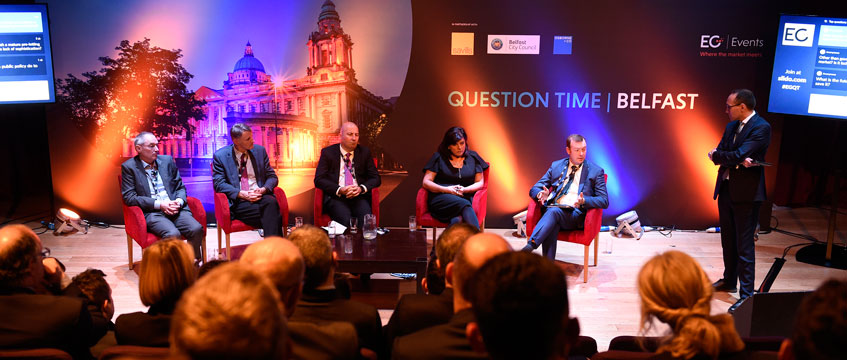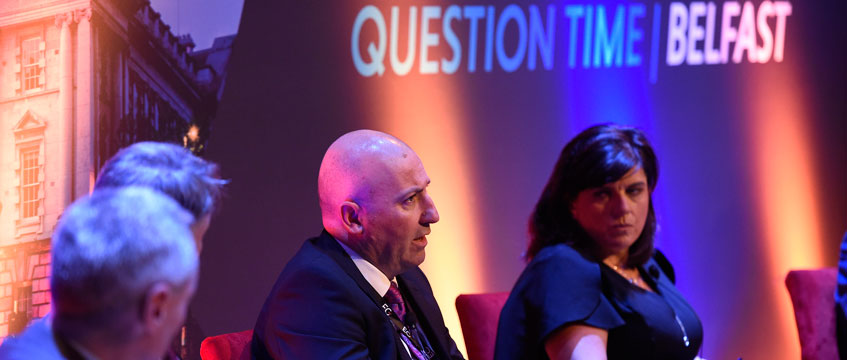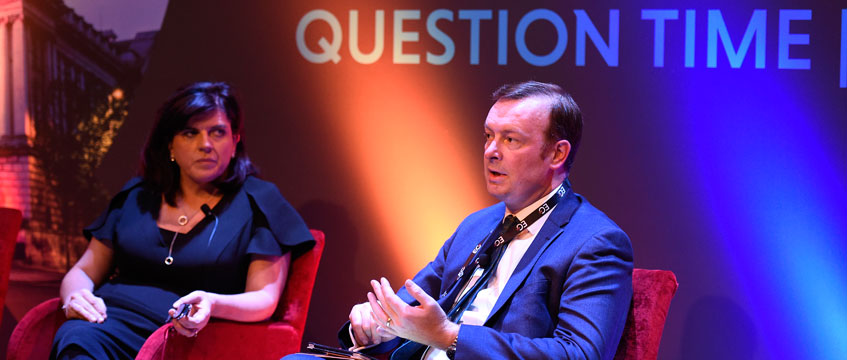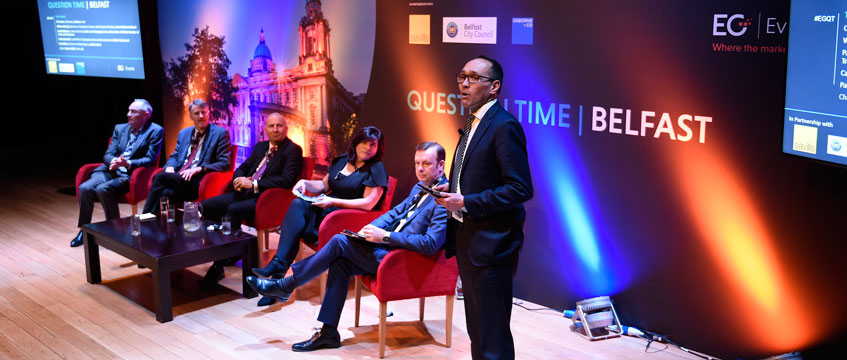Panellists at EG’s Question Time event in Belfast were confident their city had a lot to offer outside investors, despite an uncertain economic and political climate – but they were also hoping to see a more joined-up approach to redevelopment.
No government, Brexit‑induced border anxieties and a major city centre fire. These are just some of the challenges weighing on Belfast’s property market and dampening investor appetite.
It has nearly been two years since the devolved government in Northern Ireland collapsed. With no sign of this changing anytime soon, the industry is making the best of a challenging situation.
But the numbers speak for themselves. Savills expects total investment in the city’s property market to hit about £200m by the end of the year – down from £325m last year.
Speaking at EG’s Question Time at Belfast’s Grand Opera House, Paul McMahon, centre director of CastleCourt Shopping Centre and member of Belfast chamber of trade and commerce, said: “The investors are not coming quickly enough. It looks challenging ahead: we don’t have an active or functioning government. It has been like this for two years, with no sign of it changing.”
The Northern Ireland Assembly was dissolved in January 2017, when deputy first minister Martin McGuinness resigned in the wake of the RHI scandal, a failed renewable energy incentive scheme. Subsequent attempts at restoring the institutions have fallen through.
Brexit was another factor weighing on the minds of the panellists, who were speaking the day after Theresa May unveiled her draft deal.
The draft withdrawal deal between the EU and the UK includes a “backstop”, which would mean Northern Ireland would adhere to many rules of the EU’s single market.
However, so far, the wider fallout from Brexit has not had much impact on the Belfast real estate market, suggested William McCulla, director of corporate finance and property solutions at Invest Northern Ireland. “So far, we have seen no downturn from Brexit. There are a lot of US investors and professional firms and a good flow of investment.”
And while Dublin is thriving, following a spate of US-led office leasing deals (rising to nearly 2m sq ft in the first half of 2018), there are other reasons to be positive in Belfast.
Chris Kane, chairman of Osborne + Co, said: “People love to compare the two cities, but Belfast has a lot to offer. This is a remarkable place to invest. It doesn’t deserve the media representation it gets. It has great infrastructure and it is a nice place for senior execs to live.”
Osborne + Co is in the process of developing a new scheme, known as Belfast Waterside, a £50m office development that will create 270,000 sq ft of space. The proposals also include a new bridge across the River Lagan to connect the area to Belfast’s city centre.
Paul Wilson, director of retail agency at Savills Ireland, added: “The cost of living is so much lower in Belfast, which puts us on a good footing from a competitive point of view.”
Primark fire: a turning point?
The Primark fire, which devastated the city centre in August, has led to politicians and developers calling for ambitious regeneration plans.
The blaze, which destroyed a Primark store and damaged the historic Bank Buildings, has triggered a more urgent renewed focus on how Belfast can restore and revive its city centre.
Cathy Reynolds, lead officer for city regeneration and development, Belfast City Council, said: “We have set up a city centre task force to plan focused action for the city centre. The Primark fire was one trigger. We want a new attraction of scale in the city centre. This will be a £100m‑plus investment… The council has taken the lead in getting everyone together to get people back into the city centre. But we need the private and public sectors to work together.”
Some have gone as far as to claim that the fire could be an opportunity to redevelop Belfast city centre in a similar way to Manchester after the 1996 IRA bombing.
Furthermore, the city now has additional funds to deploy after chancellor Philip Hammond pledged £350m to Belfast in his 2018 Budget. He also allocated a separate £2m recovery package for businesses affected by the Primark fire.
McMahon said it was crucial to redevelop the centre in order to boost much-needed footfall. “No one ever thought a fire in the city centre would paralyse Belfast as it did. We need to give Belfast a new destination and bring people to that new destination. Bringing them back to the city centre as it is now is not an option.”
Meanwhile, Kane said the city needed to be “more joined-up” in order to redevelop the city centre. “If the council shoulders this on its own, it won’t work. We need to push together and look more coherent to the people looking at us from the outside in.”
Wilson was a little more buoyant on the city’s retail market. “Belfast is well on course for repurposing its retail. There is a lot of new investment in the city centre following the devastating Primark fire. New tenants include Matalan, Lush and Sea Salt. There is more take-up than fallout.”
Clear vision needed
The panellists said Belfast needed to come up with a “clear vision” for the future. They also indicated that despite the setbacks, the city was in a position to attract significant investment.
McMahon commented: “There is a lack of clear vision about what we do and how quickly we do it. A lot of things are just about how we can get to a good place today. We have got to find ways of generating money.”
Another question raised by the audience was whether co-working players such as WeWork could reinvigorate the market. Reynolds commented: “Prelets and getting the property market moving remain a challenge. More flexible workspace is part of the answer. A lot of occupiers want short leases.”
Looking further ahead, Kane concluded that Belfast should pay attention to the wider trends in the market. “The real estate industry is responding to the change in white collar jobs. These will change fundamentally as we move from an asset-based industry to a service industry.”
Photographs © Michael Cooper
The panel (…and what they want for Christmas)
■ Chris Kane, chairman, Osborne + Co (“The ability to see into the future.”)
■ William McCulla, director of corporate finance and property solutions, Invest Northern Ireland (“A Brexit deal to be done – whatever it is.”)
■ Paul McMahon, centre director of CastleCourt Shopping Centre and member of Belfast chamber of trade and commerce (“A healthy high street in Belfast and full shopping centres.”)
■ Cathy Reynolds, lead officer city regeneration and development, Belfast City Council (“Continued confidence in Belfast as a place to invest.”)
■ Paul Wilson, director of retail agency, Savills Ireland (“The right Brexit outcome for Northern Ireland. It is not on the table yet…”)
In partnership with
To send feedback, e-mail anna.ward@egi.co.uk or tweet @annaroxelana or @estatesgazette





















